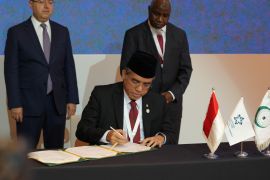"We will stop consuming ODS beginning from 2015," the head of the ministry`s ozone-depleting substance control section, Zulhasni said at a national seminar themed "protection of ozone in Indonesia and its implication on the economy here on Friday.
He said ODS consumption would be reduced by 10 percent in 2015, 37 percent in 2020, 67.5 percent in 2025, 97.5 percent in 2030 and 100 percent in 2040.
ODS consumption in the country surged more than 50 percent between 2007 and 2009 compared to a few years earlier, he said.
One of the steps to support efforts to reduce global warming was stopping ODS consumption although it would have an impact on the prices of goods produced, he said.
"We must always discuss the government`s policies with industries because industries play an important role in replacing ODS with other substances. By doing so, no refrigerators will use HCFC-22 in the future," he said.
The Montreal Protocol concerned among others which countries would invent technology to replace ODS with other substances and which countries would use substance as a substitute for ODS, he said.
"The problem now is that European countries have pressured a number of developing countries into using substitute technology," he said.
He said among electronic and household appliances using ODS were refrigerators, air conditioners, aerosol and foam.
"For example, CFC is made for a variety of foams, CFC-12 for car`s air conditioners and dispensers. However, not all appliances contain the substance particularly if they bear arm and globe logo," he said.
He said the government had prepared a strategy to rearrange the import of ODS by phasing out ODS imports, he said.
"Regional governments are expected to assist the central government in controlling the use of ODS," he said. (*)
Editor: Kunto Wibisono
Copyright © ANTARA 2011









